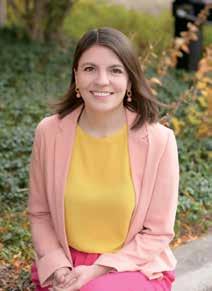
4 minute read
CREATING A LEGACY OF EQUITY
shared vision for the future of their region. It is also a community engagement tool, providing opportunities for all community members of all means to give back to the place they call home.
Because formal philanthropy has traditionally been associated with extreme wealth, the Community Foundation must acknowledge its own history of overlooking or excluding marginalized groups from active philanthropic participation. As we continue our efforts to advance equity within our organization and within the community, we strive to engage diverse individuals as participants and partners in giving. We look forward to a day when the legacies and donors whose stories we steward are as diverse as the community we serve.
Honoring legacies and lived experiences — Behind each legacy gift is a story. Each of our legacy donors is the author of a charitable vision that is distinct and deeply personal. Many legacy donors make gifts in support of causes that address inequities that they have observed or experienced firsthand during their lifetime. When legacy donors choose to share their stories — stories of empathy, excellence and resilience — they are making an additional gift, seeding hope and inspiration for future generations. Especially for residents whose voices have historically been silenced, leaving a charitable legacy centers, amplifies and preserves important community narratives.
What do you hope your charitable legacy will be? How would you like to be remembered after you’re gone? What lasting impact on the community do you hope will result from your gift?
In my role as senior philanthropic advisor, these are questions I ask regularly of donors who are seeking to make a lasting difference by leaving a legacy gift. It’s my job to help people reflect on what legacy means and, more specifically, what legacy means within the context of personal and community philanthropy. The truth is that legacy means something different to each of us. There is both the legacy we inherit and the legacy we leave, which can be personal, familial, communal and institutional. The stories and legacies passed from generation to generation help to create the cultures and values that inform philanthropic giving and community support. But legacies are not just left behind, legacies are lived.
As a community, we have inherited both needs and opportunities. Due to centuries of systemic racism and exclusionary economic practices, many of these needs are disproportionately experienced by residents of color. Issues like the childhood lead poisoning crisis, poverty, education and opportunity gaps, and poor health outcomes are exacerbated by racial inequities, which are experienced by 47% of Syracuse residents.
Communities are stronger when all members have opportunities to participate and thrive, and the same is true of community-based philanthropy. Community-based philanthropy is a way for neighbors to invest and realize a

The questions posed at the beginning are aspirational by design. They are meant to elicit hopes and visions that have not yet been realized. In the space between our present reality and those answers is where we find action and inspiration. While there are elements of our shared community history that have enabled structural barriers to remain intact for far too long, many donors are using legacy giving as an opportunity to write a new collective vision and story for Central New York.
FOLLOWING ARE SOME EXAMPLES:
Endowing progress — In many instances, legacy giving provides an opportunity for individuals to make their most impactful gifts. Most legacy gifts are many times larger than average lifetime gifts and they are typically endowed to provide lasting impact. Addressing longstanding inequities in our community, built up over centuries, requires a long-standing commitment to progress and social change. Legacy donors who add to, or create, permanent endowed funds to address racial equity and social justice issues are ensuring that the funds available to effect positive change will be around for as long as they are needed.
Leveraging collective & collaborative giving — Every legacy gift is meaningful and every individual has the ability to make a difference. When donors choose to direct an estate gift to one of our existing funds, like the Black Equity & Excellence Fund, 5forCNY Fund and others, they are combining their gift with many others, empowering us to make responsive grants and proactive community investments based on current and greatest needs. The power of these types of funds is in their collective impact, in many cases enabling grants and investments on a larger scale than could be made individually.
Embracing trust-based philanthropy and social change principles — Philanthropy has often ignored the implicit power imbalance that exists between funders and grantees, or donors and recipients. Increasingly, donors and funders are prioritizing trustbased principles and practices, emphasizing collaboration, transparency, dialogue and relationship-building. This more inclusive, trust-based approach to funding recognizes that there is great value in involving those most affected by an issue to be a part of its solution. One way legacy donors are supporting populations that have experienced historic underinvestment is by directing their gifts to organizations that are led and governed by individuals belonging to those same populations.
Extending values through investment —
When a legacy donor plans to establish their own endowed fund with an estate gift, they also have the option to choose how that fund will be invested by selecting either our main investment pool or our Sustainable Responsible Impact (SRI) investment pool. The goal of the SRI investment pool is to achieve strong risk-adjusted returns in investments that have a positive impact on the world. Our SRI pool seeks to promote, support and advance values and impact areas like anti-racism, economic justice, human rights and other areas embodied in our mission and vision. For many donors, their legacy gift provides a way to extend their values and hopes for future generations. Additionally, some legacy donors have opted to utilize the SRI investment pool as a way to further leverage just outcomes within, and beyond, our community.





